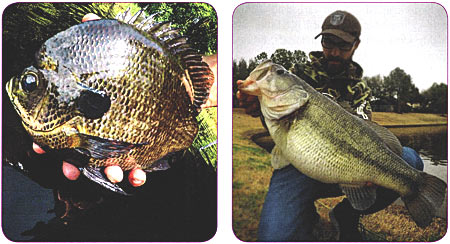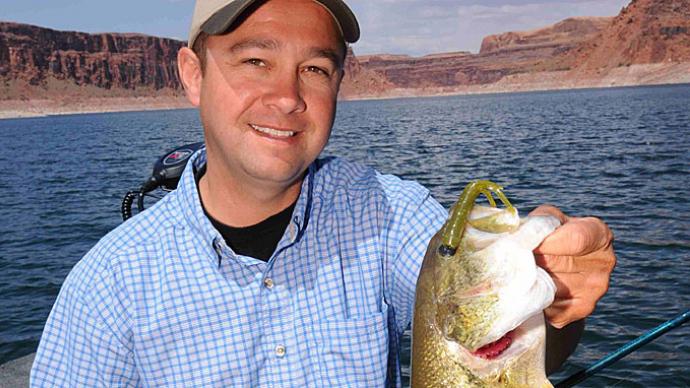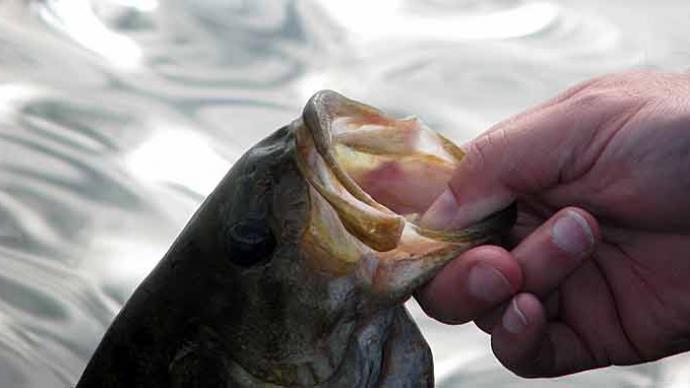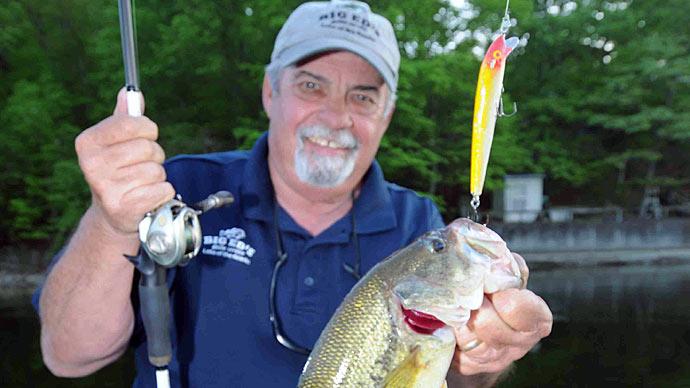
Here it is July, and I'm writing about fishing the spawn. Your fish are probably mostly finished by now, but there may be one more run at it with bass, and there will definitely be more bluegills on beds this year. Plus, this topic is fresh on my mind, after catching some really good fish late last spring. And, you can use this information next year, too.
When it comes to fishing, the spawn can be one of the most exciting, yet also one of the most frustrating times of the year. After all, what could be more frustrating than seeing a huge fish on a bed, and exhausting every tactic and lure in your arsenal, and still not catching her?
Speaking from my own experiences, I have seen a nine-pound bass attack my jig on a flip onto her bed and felt like the biggest hero in the world. However, I have also spent countless hours casting to one giant bass, and even some giant bluegill, without getting them to bite— and I felt like breaking a rod over my knee. I certainly don't have all the answers when it comes to bed fishing, but in this article, I'd like to share what I have learned from all those fish I didn't catch, and shed a little light on what I did do right with fish caught.
Without a doubt, the most fascinating aspect of the spawn is that the fish places its instincts to breed and reproduce over its instincts to survive. Every other time of the year, if that fish sees you or feels your footprints on the bank even remotely close to her, she's gone.
However, during spawn that fish will typically allow you to creep much closer. She is fully aware you are there, but instincts tell her to stay near the bed, instead of leave for the safety of deep water. The instinct to breed is so strong, that when the fish is on a bed, their instincts to feed are curbed as well. They have a singular focus—lay those eggs. A fish on a bed is not looking to eat your lure, or even any innocent baitfish that may be swimming by. Most of the year, we are searching for fish that are in a feeding mode. However, in the spawn, we aren't looking for fish that want to eat our lure. We are looking for fish that we can aggravate!
I don't want to venture into the biological aspects of the spawn very much, seeing as my experience is more in fishing than biology, but from what I can tell, the female, the bigger bass on the bed, is only there for a day or two. She's there just long enough to deposit eggs, and then she's gone. It is the male's job to scope out the spawning area to find a good shallow location with a hard bottom and plenty of sunlight. The bigger bass, the egg-laden females, will eventually come to scope out possible spawning grounds, and the biggest bass have their pick of what male's bed to choose. One important point to make is the male spawning bass is quite likely one of the easiest fish to catch. Both the male and female bass come to the bed, but the male takes it much more seriously. He is there from start to finish. The female normally only comes onto the bed to drop her eggs, and maybe stick around for a little while longer. She may even linger several feet away for a period of time, but the male guards the spawn.
Diving back into the fishing, I would like to approach one scenario in which many pond anglers find themselves. They are walking the bank, or they are in their jon boat on their pond, and they see a clearing on the bottom of the pond on a sunny bank, and a few dark shapes in the middle of it. The usual feelings of panic and excitement flood into our veins when we realize that the shadows in that bed are in fact a small male, and massive female, bass. What do you do? Freak out? Of course. But after the initial freak out, how do we approach this situation?
The younger me would have just started casting immediately to the fish. Maybe even walk a little closer, see how close I could get to this fish, and even try to hit the fish with my lure. The older, (only slightly) wiser me, takes a different approach. The bottom line is, if you see that fish, that fish sees, and likely feels you. Each footstep on land can be felt by that fish in the water, and I really do think those fish are hyper-aware of what is going on above the water, especially in the shallow spawning phase. So, in almost every case, if you know that fish is there, that fish knows you are there. The good news is, that fish has a short memory. If you spooked her off the bed, she will come back. If you did not spook her, she likely still knows you are there.
The best thing to do, in this case, is freeze. You have one cast right now to make this happen. If a spawning bass does not bite on the first cast, then it may take a while to actually entice that fish. But the first cast can tell you a lot of information. Please, for the love of all that is good, do not make your first cast right on top of the bed. If at all possible, cast your lure well onto the shore, past that nest. If you are on the bank, cast your lure way out into open water. Ideally, bring the lure onto the bed from a long distance away. If that bass sees you, her guard is already up, and a lure plopped right over her head may make her even more wary. But those long casts, with a lure slowly worked into her area, may make her forget about you, and focus on the encroaching jig, or lure, of choice.
The posture of that fish as your lure crawls slowly closer to her bed can tell you a lot. If she turns towards it, and angles herself down towards it at all, she's clearly antsy about the lure being there. Ideally, with each twitch you make, she will ease closer and closer until she is nose down on it, and ideally suck the lure in. That's the ideal situation. However, as we know, fishing is rarely ideal. If I do not catch that fish right off the bat, here is what I normally do to try to breakdown how to catch her.
As difficult as it may be, take a good look at the area surrounding the bed. Pay close attention to any branches, laydowns, moss—any landmark you can find, and make a mental image of that bed in your mind, and as crazy as it may seem, back off until you cannot see the fish. Once you are out of her sight, she will go back into whatever mode she was before you encroached. I've found the best thing for finicky bass is to get well away from them and make repeated long casts to where you know they are. A bass with an angler in sight is a much different fish than a fish without an angler in sight. You already know where that fish is and you certainly do not need to see her to catch her. I like to make a long cast (still a ways away from the target) and slowly work the lure over the bed, again and again.
Why slowly? Think about a gnat on your skin. If it lands for a split second, and takes off, you don't smack it. If it stays long enough for you to feel it, you get aggravated and feel the need to do something about it. No difference here. That fish is looking at your lure, and each second it stays there, she is getting more and more uptight about it. Eventually, she is going to have to do something about it. She gets irritated to protect what she's trying to do—spawn.
At some point in this excitement, you will feel the familiar thump on your line, you rear back, set the hook and a two-pound bass comes flying back at you. This is all too common: you caught the male bass off of the bed. If you release that fish immediately, he will likely go back to the bed, no harm done. However, as stated previously, it is his job to guard the bed. In most cases, he will be the aggressor. If you are confident in the bass population in your pond, you can simply put that fish in the live well, and resume fishing until you catch the female, who is now on double duty, seeing as her main bed protector has left. If you do not want to hold onto that fish, my best advice is to increase you lure size. That two-pound bass will not be so keen to attack a 12- inch worm, or a big swimbait. Upping your lure size to intimidate the smaller fish, will leave the bigger female feeling forced to attack that lure.
On almost every bass and bluegill bed, you will find there is a sweet spot. This is a tiny area on the bed where the bass get triggered the most. You can hop your lure all over the bed, but you may never get the bite until you work that lure over the tiny square inch of the bed that makes the bass the most aggravated. This is why repeated casts can be so important. It may take an hour, but eventually, you will get the right lure on the right spot of that bed to trigger that strike.
In my opinion, there is not one specific lure that works the best for spawning fish. My favorite will always be the jig, however. The way the jig crawls along the bottom, seemingly nose down, in a feeding posture, can really aggravate the fish to no end. The flaring of the skirt on a jig also imitates an angry bluegill flaring its gills, or a crawdad with its claws up. As we all know, a bass will not stand for that nonsense! Another tactic to try, if all else fails, is to use a very slow-falling lure. A bass is usually suspended above her bed a small bit, and it is possible the only way to annoy her enough is to place something directly in front of her.
As a pondmeister, seeing huge bluegill and bass move onto spawning grounds has got to be one of the most rewarding aspects of owning a pond. And in some cases, perhaps targeting trophy fish on beds isn't in the best interest of the pond. Its always best to consult your favorite professional pond manager to see if your fish populations are up for spawn fishing. When the time does come for you to fish the spawn, and you see that dark shadow, I sure hope you can make that first cast count. If not, better call home— because we all know you probably aren't going home without a picture of that fish! And, it may take a while.
Reprinted with permission from Pond Boss Magazine




